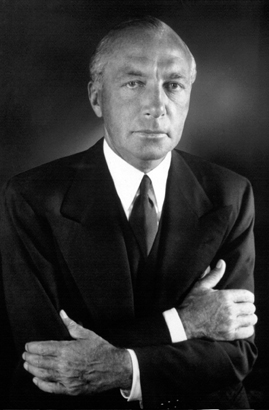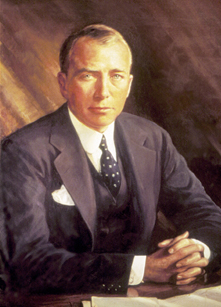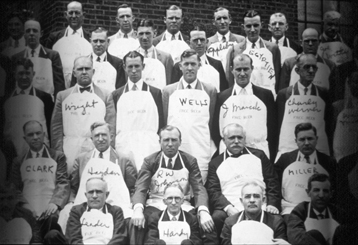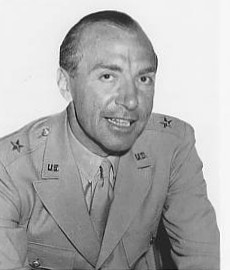Congratulations, Robert Wood Johnson!

What do General Robert Wood Johnson, Frank Sinatra, Albert Einstein, Bruce Springsteen and Toni Morrison all have in common? They are among the first group of inductees into the New Jersey Hall of Fame. Yesterday (May 4th) General Robert Wood Johnson was among the first group of New Jersey citizens inducted into the New Jersey Hall of Fame, sharing the occasion with other notable New Jerseyans Harriet Tubman, Thomas Alva Edison, Albert Einstein, Clara Barton, Frank Sinatra, Buzz Aldrin, Yogi Berra, Malcolm Forbes, Vince Lombardi, General Norman Schwarzkopf, Toni Morrison, Bruce Springsteen, Meryl Streep and Bill Bradley. General Johnson was recognized for visionary leadership and for building Johnson & Johnson into the global company it is today, as well as for his philanthropy. The General’s grandson Robert Wood (Woody) Johnson accepted the award. General Robert Wood Johnson (1893 -- 1968) was the son of Company founder Robert Wood Johnson, and was born and grew up in New Brunswick. He spent his formative years around Johnson & Johnson, often accompanying his father to business meetings and events and, when he was old enough, he worked summers at his family’s company just a few blocks away from his house. The death of his father in 1910 accelerated his plans to join his family’s business, and he did so instead of attending college after he graduated from Rutgers Prep.

Robert Wood Johnson had a long tradition of public service and philanthropy, which was influenced by the lessons he learned as a child from his father, one of the three brothers who founded Johnson & Johnson. Some of Robert Wood Johnson’s notable accomplishments: He served as Mayor of Highland Park when he was 26. He wrote Our Credo in 1943, which 65 years later, continues to guide the Company and outline the responsibilities of Johnson & Johnson to, in the following order, doctors, nurses, patients and all those who use our products and services; employees; the communities in which we live and work; and last, our shareowners. (When Robert Wood Johnson wrote that, he was the largest shareowner, and he put himself last.) Johnson felt that, if we do the first three things correctly, then the last item would take care of itself. He was the architect of the Company’s policy of decentralization and of our global growth and expansion from a small family-owned business into a worldwide family of companies. Starting with donating its first typewriter in 1918, Johnson supported Middlesex Hospital (Now known as Robert Wood Johnson University Hospital) and St. Peter's University Hospital, and contributed to the education and training of nurses and the field of hospital management countrywide. It was Johnson’s idea that hospitals should be organized by medical specialty, something that was rare when he suggested it and is common practice today.

Robert Wood Johnson (lower center) and Employees
Johnson was a thinker and writer about business, and was the author of a number of widely read books and articles. Many of his ideas went squarely across the grain, such as his thoughts about the ethical responsibilities of business, or his repeated calls during the Great Depression for higher wages for workers. In the 1930s, in a pamphlet called “Try Reality,” he wrote: “…industry only has the right to succeed where it performs a real economic service and is a true social asset.”

General Robert Wood Johnson in Uniform, 1940s
Johnson was named by President Franklin D. Roosevelt to head the Smaller War Plants Corporation in Washington during World War II, and was appointed to the rank of Brigadier General. He served for only about two months before he left, frustrated with the bureaucracy, but the title stuck with him. General Robert Wood Johnson left the bulk of his fortune to the Robert Wood Johnson Foundation. Johnson embraced his reputation as a maverick, as illustrated by one of his favorite sayings: “Why be difficult when with a little more effort you can be impossible.” [Saying quoted from "General Johnson Said…," by Philip B. Hofmann, 1971, Leury, Marks & Strasser, Inc., North Brunswick, NJ, p. 54]

Can you please post the RW Johnson document entitled "Our Management Philosophy" that was written around the same time as the original CREDO.
Timothy,
I will definitely do a post on General Johnson's "Our Management Philosophy," so please keep checking back with the blog!
Margaret